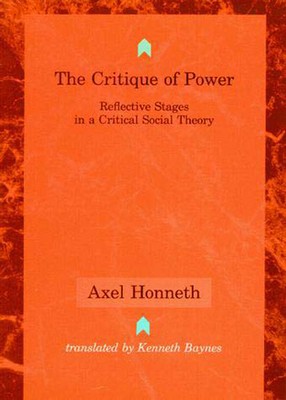
- We will send in 10–14 business days.
- Author: Axel Honneth
- Publisher: MIT Press
- ISBN-10: 0262581280
- ISBN-13: 9780262581288
- Format: 14.9 x 22.6 x 2.2 cm, minkšti viršeliai
- Language: English
- SAVE -10% with code: EXTRA
Reviews
Description
In this rich interpretation of the history of critical theory, Axel Hormeth clarifies critical theory's central problems and emphasizes the social factors that should provide it with a normative and practical orientation.Axel Honneth's Critique of Power is a rich interpretation of the history of critical theory, which clarifies its central problems and emphasizes the social factors that should provide that theory with a normative and practical orientation.
Honneth focuses on the dialog between French and German social theory that was beginning at the time of Michel Foucault's death. It traces the common roots of the work of Foucault and Jürgen Habermas to a basic text of the last generation of critical theorists--Max Horkheimer and Theodor Adorno's Dialectic of Enlightenment--and draws from this connection the outline of a program that might unite and surpass their seemingly irreconcilable methods of critiquing power structures. In doing so, Honneth provides a constructive and nonpolemical framework for comparisons between the two theorists. And he presents a novel interpretation of Foucault's analysis of social systems.
Honneth traces the internal contradictions in critical theory through an analysis of Horkheimer's early programmatic writings, the Dialectic of Enlightenment, and Adorno's later social-theoretical writings. He shows how Habermas and Foucault in their distinctive ways reinserted the social world into critical theory but argues that neither operation has been wholly successful. His cogent analysis redirects critical social theory in ways that can draw on the strengths and avoid the weaknesses of the two approaches.
EXTRA 10 % discount with code: EXTRA
The promotion ends in 23d.19:52:11
The discount code is valid when purchasing from 10 €. Discounts do not stack.
- Author: Axel Honneth
- Publisher: MIT Press
- ISBN-10: 0262581280
- ISBN-13: 9780262581288
- Format: 14.9 x 22.6 x 2.2 cm, minkšti viršeliai
- Language: English English
Axel Honneth's Critique of Power is a rich interpretation of the history of critical theory, which clarifies its central problems and emphasizes the social factors that should provide that theory with a normative and practical orientation.
Honneth focuses on the dialog between French and German social theory that was beginning at the time of Michel Foucault's death. It traces the common roots of the work of Foucault and Jürgen Habermas to a basic text of the last generation of critical theorists--Max Horkheimer and Theodor Adorno's Dialectic of Enlightenment--and draws from this connection the outline of a program that might unite and surpass their seemingly irreconcilable methods of critiquing power structures. In doing so, Honneth provides a constructive and nonpolemical framework for comparisons between the two theorists. And he presents a novel interpretation of Foucault's analysis of social systems.
Honneth traces the internal contradictions in critical theory through an analysis of Horkheimer's early programmatic writings, the Dialectic of Enlightenment, and Adorno's later social-theoretical writings. He shows how Habermas and Foucault in their distinctive ways reinserted the social world into critical theory but argues that neither operation has been wholly successful. His cogent analysis redirects critical social theory in ways that can draw on the strengths and avoid the weaknesses of the two approaches.


Reviews